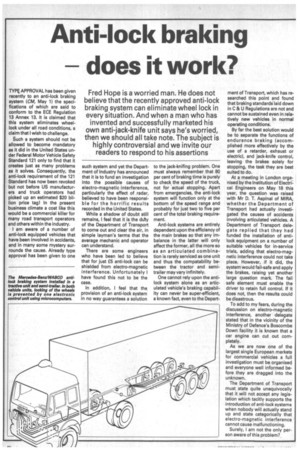Anti-lock braking does it work?
Page 46

If you've noticed an error in this article please click here to report it so we can fix it.
Fred Hope is a worried man. He does not believe that the recently approved anti-lock braking system can eliminate wheel lock in every situation. And when a man who has invented and successfully marketed his own anti-jack-knife unit says he's worried, then we should all take note. The subject is highly controversial and we invite our readers to respond to his assertions
TYK APPROVAL has been given recently to an anti-lock braking system (CM. May 1) the specifications of which are said to conform to the ECE Regulation 13 Annex 13. It is claimed that this system eliminates wheellock under all road conditions, a claim that I wish to challenge.
Such a system should not be allowed to become mandatory as it did in the United States under Federal Motor Vehicle Safety Standard 121 only to find that it creates just as many problems as it solves. Consequently, the anti-lock requirement of the 121 Standard has now been revoked but not before US manufacturers and truck operators had picked up an estimated $20 billion price tag! In the present business climate a cost like this would be a commercial killer for many road transport operators and others within the industry.
I am aware of a number of anti-lock equipped vehicles that have been involved in accidents, and in many some mystery surrounds the cause. Already type approval has been given to one such system and yet the Department of Industry has announced that it is to fund an investigation into the possible causes of electro-magnetic interference, particularly the effect of radar, believed to have been responsible for the horrific results recorded in the United States.
While a shadow of doubt still remains, I feel that it is the duty of the Department of Transport to come out and clear the air, in simple layman's terms that the average mechanic and operator can understand.
There are some engineers who have been led to believe that for just £5 anti-lock can be shielded from electro-magnetic interference. Unfortunately I have found this not to be the case.
In addition, I feel that the provision of an anti-lock system in no way guarantees a solution to the jack-knifing problem. One must always remember that 80 per cent of braking time is purely to check the speed of the truck, not for actual stopping. Apart from emergencies, the anti-lock system will function only at the bottom of the speed range and probably for just two to five per cent of the total braking requirement.
Anti-lock systems are entirely dependent upon the efficiency of the main brakes so that any imbalance in the latter will only affect the former, all the more so as an articulated combination is rarely serviced as one unit and thus the compatability between the tractor and semitrailer may vary infinitely.
One cannot rely upon the antilock system alone as an articulated vehicle's braking capability can never be super-efficient, a known fact, even to the Depart
ment of Transport, which has researched this point and found that braking standards laid down in C & U Regulations are not and cannot be sustained even in relatively new vehicles in normal operating conditions.
By far the best solution would be to separate the functions of endurance braking (accomplished more effectively by the use of a retarder, exhaust or electric), and jack-knife control, leaving the brakes solely for stopping, the task they are best suited to do.
At a meeting in London orga: nised by the Institution of Electrical Engineers on May 18 this year, the question was raised with Mr D. T. Aspinal of MIRA, whether the Department of Transport had actually investigated the causes of accidents involving articulated vehicles. A Department of Transport delegate replied that they had funded the installation of antilock equipment on a number of suitable vehicles for in-service trials, adding that electro-magnetic interference could not take place. However, if it did, the system would fail-safe and apply the brakes, raising yet another large question mark. The fail safe element must enable the driver to retain full control. If it does not, then the results could be disastrous.
To add to my fears, during the discussion on electro-magnetic interference, another delegate stated that in the vicinity of the Ministry of Defence's Boscombe Down facility it is known that a car engine can cut out completely.
As we are now one of the largest single European markets for commercial vehicles a full investigation must be organised and everyone well informed before they are dragged into the unknown.
The Department of Transport must state quite unequivocally that it will not accept any legislation which tacitly supports the introduction of anti-lock systems when nobody will actually stand up and state categorically that electro-magnetic interference cannot cause malfunctioning.
Surely, I am not the only person aware of this problem?




















































